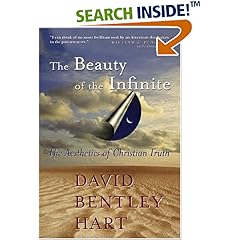
All done with The Spirit of Islamic Law and am now moving on to The Beauty of the Infinite by David B. Hart, an American theologian from one of the Eastern Orthodox Churches (not sure which one). I am very much looking forward to this book, I haven't read any good, difficult contemporary theology in quite some time. The truth be told most contemporary theology is mediocre, dealing with questions that are totally uninformed by persecution and mission and the reality of what it looks like to live with costly faith and grace that is not cheap.
But enough of my griping. Am interested in knowing if any of you have read this book, and if so what you thought about it. I have heard this book described as the best book of theology written by an American in the last decade or so. We shall see.
And Happy Birthday to my good friend Erik over at Of Priests and Paramedics who kindly gave me this book as a gift.
4 comments:
It is enough to say that he is Orthodox. I have never thought about which "church" he was from, since the Orthodox churches are, essentially, united theologically (I exclude the non-Chalcedonians, of course).
You've seen it all now, an unrepentant, Latin-Mass attending, Roman Catholic defending the unity of Eastern Orthodox Churches. :)
Hi Rob, but there are theological skirmishes that are significant. For example who recognizes whom? The Russian Orthodox recognize the Orthodox Church of America (OCA), but the folks in Constantinople DON'T recognize them. Also, quite soem tiem ago the Orthodox Churches of Romania and Cyprus both recognized the validity of Anglican Orders. No one else did.
I think Orthodoxy is more like Anglicanism in its polity to be honest. Any given city in the USA (for example) may well have seven or eight Orthodox bishops. Like the Anglicans, no?
I read a good portion of it when I worked in a convenience store, but I gave it up, because it was a very demanding book, my roommates liked to interrupt too much, and it requires a lot of concentration and rereading. It is good enough that I intend to buy it (so that I can make my own notes). Just beware: read it when you won't be interrupted and when you have a standard enough schedule that you get rest. It is a difficult book to read, but it is rewarding.
It won't touch on any of the realities in a persecuted nation. You can't really expect that from a theologian who doesn't live under persecution. It is, rather, a book trying to bury some of the postmodernism that has infected our culture (e.g. Foucault)
Since I commented on the other, I must say that you are right to some degree. Our current situation in America is scandalous and sinful. I can only hope and pray for it to end soon.
Abu Daoud,
Yes, but those are more political fights. Theologically, they agree. Catholic or Protestant is a significant distinction: it tells you a great deal about a persons beliefs (or what their beliefs should be, in the case of a Catholic). One orthodox may not recognize a particular patriarch as 'his' patriarch, but he still recognizes the man as a Patriarch. See my point? I may claim the Romanian patriarch to be mine, but I still recognize the office of the Patriarchs of Constaninople, Alexandria, Antioch, etc.
The Orthodox jurisdictional scene (and the Anglican) in the West is scandalous, but, really, compared to the scandals on my side of the fence, it's no big deal.
Post a Comment